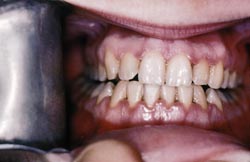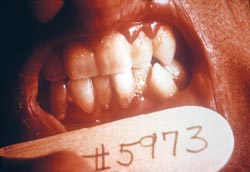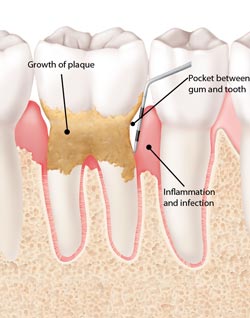
Ever wonder why pictures of President George Washington never show him smiling? He suffered from poor dental health, lost his teeth at an early age, and had them replaced with two sets of false teeth, carved from hippopotamus ivory and gold. They were uncomfortable.
If you have gum (periodontal) disease, you are not alone. Many U.S. adults currently have some form of the disease. It ranges from simple gum inflammation, called gingivitis, to serious damage to the tissue and bone supporting the teeth. In the worst cases, you lose teeth.
Whether your gum disease is stopped, slowed, or gets worse depends on how well you take care of your teeth and gums every day, from now on.
Who gets gum disease?
Generally, people don't show signs of gum disease until their 30s or 40s. Men are more likely to develop it than women. Although teenagers rarely develop the severe disease, periodontitis, they can have the milder gingivitis.
Most commonly, gum disease develops when plaque is allowed to build up along and under the gum line.
What causes gum disease?
Our mouths are full of bacteria. Along with mucus and other particles, they constantly form a sticky, colorless "plaque" on teeth. Brushing and flossing help get rid of plaque. Plaque that is not removed can harden and form "tartar" that can only be removed by thorough cleaning by a dentist or dental hygienist.
Gingivitis: Mild Gum Disease
The longer plaque and tartar remain, the more harmful they become. The bacteria inflame the gums, which become red, swollen and can bleed easily. This is called gingivitis, a mild form of gum disease. Usually it can be reversed with daily brushing and flossing and regular cleaning by a dentist or dental hygienist. Typically, there is no loss of bone or tissue that hold teeth in place.
Periodontitis: Severe Gum Disease
Left untreated, gingivitis can advance to "periodontitis" (which means "inflammation around the tooth"). Here, gums pull away from the teeth, forming pockets that become infected. The body's immune system fights the bacteria as the plaque spreads and grows below the gum line. The infection starts to break down the bone and connective tissue holding the teeth. If not treated, the bones, gums, and tissue are destroyed. Eventually the teeth loosen and may have to be removed.


Photos of gingivitis (top) and periodontitis (bottom) show inflamed gums. Left untreated, these conditions can result in gum damage and loss of teeth.
Photos: Center for Disease Control and Prevention (CDC)

Illustration: Krames
Do you have gum disease?
Symptoms include:
- Bad breath that won't go away
- Red or swollen gums
- Tender or bleeding gums
- Painful chewing
- Loose teeth
- Sensitive teeth
- Receding gums or longer-appearing teeth
Any symptom may signal a serious problem and should be checked by a dental professional. The dentist or hygienist should:
- Ask about your medical history to identify underlying conditions or risk factors (such as smoking).
- Examine your gums and note any signs of inflammation.
- Use a tiny ruler ('probe') to check for and measure any pockets between the gums and teeth. In healthy mouths, pocket depth is usually between 1 and 3 millimeters. (Three millimeters is about a tenth of an inch.) This test is usually painless.
- The dentist or hygienist may also:
- Take an x-ray to see if there is any bone loss.
- Refer you to a periodontist—an expert at diagnosing and treating gum disease, who may recommend treatment options not offered by your dentist.
How can I prevent gum disease?
- Brush your teeth twice a day (with a fluoride toothpaste)
- Floss daily
- Visit the dentist regularly for a check-up and professional cleaning
- Eat a balanced diet
- Don't smoke
